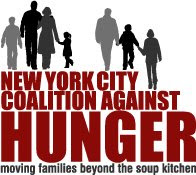Testifying before a joint hearing of the New York City Council Committees on Civil Rights and Consumer Affairs, NYCCAH Executive Director Joel Berg exhorted city officials to take responsibility for combating rising hunger rates by committing to large-scale anti-poverty initiatives, citing the effectiveness of Great Society programs, which cut poverty rates in half in the 1960s and 1970s. Berg noted that poverty rates have risen during Mayor Bloomberg’s administration despite his avowed commitment to ending poverty, and in response to the implementation of small-scale anti-poverty pilot programs across the city, which have placed the onus for economic change upon poor individuals. “We cannot dramatically reduce poverty without significant new expenditures. Trying to reduce poverty without increasing the money available to low-income families is like trying to reduce drought without increasing the availability of water” said Berg, who also noted that, while poverty has increased, so too have tax breaks for large City Corporations. “The original investment in the City’s poverty initiative was only $150 per year million, which equals only $97 per person living in poverty. In contrast, Goldman Sachs is getting an average of $83,000 in government funding for each person who is going to work in the new headquarters,” he observed. To begin to combat these massive inequities, Berg called on city, state and federal officials to commit to enacting a living wage, increase EITC funding and make it easier for individuals and families to access government programs like food stamps, WIC, and subsidized health insurance.
Providing news and commentary on issues facing the City's anti-hunger community

The New York City Coalition Against Hunger represents New York City’s over 1,200 soup kitchens and food pantries and the 1.3 million low income New Yorkers who are forced to use them. The Coalition works to meet the immediate food needs of low-income New Yorkers and enact innovative solutions to help them move “beyond the soup kitchen” to self-sufficiency.
Blog Archive
-
▼
2008
(116)
-
▼
May
(12)
- Fast Food Tax Breaks Conflict with City Health Ini...
- Economic Crisis Fuels Twin Threats of Hunger and O...
- What's At Stake
- Congress Set to Re-Play Veto Override
- Hunger and Abundance
- Rising Food Costs Pose Increased Threat to Seniors...
- House Passes Farm Bill With Veto Override in Sight
- AG Secretary Fumbles on Farm Bill Nutrition Title
- Executive Director Berg Calls on City to Increase ...
- Seven Months Later, Farm Bill Still Faces Veto
- Faced with Supermarket Shortages, City and Communi...
- Court Mandates HRA Compliance with Food Stamp Proc...
-
▼
May
(12)
1 comment:
http://cityroom.blogs.nytimes.com/2008/05/12/hows-the-soup-for-borough-park-needy-its-kosher/
Post a Comment